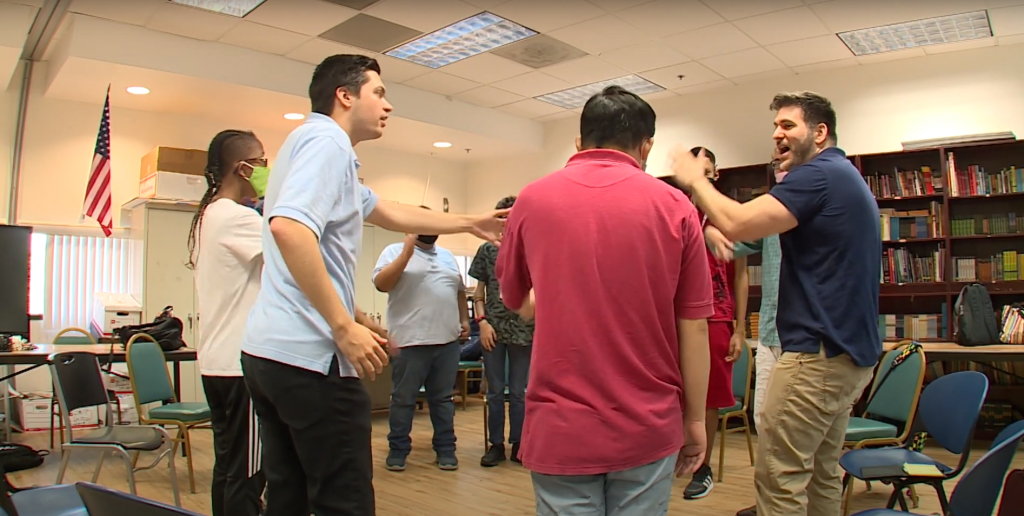Empowering Adults with Special Needs: Harnessing the Power of Improv for Workforce Integration
Introduction:
Adults with special needs often face unique challenges when entering the job market, particularly in areas such as communication, confidence, and social interactions. This white paper explores the transformative potential of implementing improv programs within non-profit organizations that support adults with special needs, aiming to enhance their employability. By focusing on the intersection of improv, personal growth, and job readiness, we present compelling evidence for the inclusion of improv initiatives in grant-funded projects. Read on to learn about improv for work.

Understanding the Benefits of Improv for Adults with Special Needs:
Improv games and activities provide a remarkable platform for personal growth and skill development. They encourage participants to make choices, take action, and receive support through agreement and positive reinforcement. By conducting these activities in a group setting, participants not only learn to support themselves but also become a source of support for others. This inclusive environment nurtures confidence, communication skills, and the ability to overcome challenges faced in the job market.
Tailoring Improv Techniques for Adults with Special Needs:
Customizing improv games and activities to meet the specific needs of participants is essential for effective outcomes. Understanding the cognitive and functional abilities of each individual allows facilitators to adapt games accordingly. For instance, the game “Storytime” can be modified by providing participants with choices when creating the story, allowing them to exercise decision-making skills. Non-verbal participants can benefit from communication tools or interpreters, ensuring everyone can actively participate and benefit from the improv experience.
Building Confidence through Improv:
Improv games and activities provide a unique opportunity for participants to speak in front of a group, present ideas, and actively contribute to the creative process. By embracing failure as an integral part of the learning journey, participants develop resilience and self-assurance. Notably, Anthony Francis Cutaia, founder of Anthony Francis Improv U, LLC, has witnessed remarkable transformations in individuals who were previously reluctant to speak. Increased confidence and improved communication skills were observed in participants who engaged in improv sessions, demonstrating the effectiveness of this approach.
Enhancing Communication Skills through Improv:
Improv fosters active listening skills, a fundamental aspect of effective communication. Participants engage in games such as “Storytime,” “Emotional Check-In,” and “Did you hear the good news,” which require focused attention and attentive listening throughout the sessions. Improv also provides a platform for participants to practice effective speaking, utilizing techniques such as standing up, introducing themselves, and sharing personal preferences. Gentle side coaching during exercises enables real-time adjustments, ensuring optimal skill development.
Improv has been proven to have a profound impact on communication skills, as observed by Caitlyn Brash, a Jobsite trainer at Gulfstream Goodwill Academy. Over the course of one year, clients who participated in improv classes once every other week experienced notable improvements in communication, confidence, and teamwork. Caitlyn noted that improv empowered her clients to take on more responsibility and tasks that they previously lacked the confidence to undertake.
One striking example is the transformation in their ability to provide customer service. Instead of solely focusing on cleaning and keeping to themselves, participants began actively engaging with guests in the café, demonstrating their newfound confidence. They started asking questions when they needed clarification, showcasing their enhanced communication skills and willingness to interact with others.
This firsthand account underscores the practical application of improv training in real-life scenarios. By instilling confidence and breaking down communication barriers, improv equips individuals with the necessary skills to actively engage with colleagues, customers, and superiors in a professional setting. These newfound abilities not only enhance their job performance but also contribute to their overall personal growth and success.
The success observed by Caitlyn Brash’s clients further emphasizes the value of implementing improv programs within non-profit organizations dedicated to supporting adults with special needs. Grant-funded initiatives can enable these organizations to provide consistent and long-term improv training, leading to transformative outcomes and increased employability for their participants.
By incorporating the experiences and insights of professionals like Caitlyn Brash, non-profit organizations can enhance their understanding of the practical benefits of improv in fostering communication, confidence, and teamwork among adults with special needs.
The Role of Improv in Work for Job Readiness:
The communication skills developed through improv directly translate to job settings. Active listening is crucial for learning job expectations and providing excellent customer service. Effective speaking is essential when addressing colleagues, management, and customers. Furthermore, understanding body language and emotional expression enhances participants’ ability to navigate social cues in professional environments. By instilling these skills, improv equips individuals with the tools necessary for success in various industries, such as hospitality and maintenance.
Implementing Improv Programs for Adults with Special Needs:
Implementing improv for work programs requires experienced facilitators who possess a strong understanding of the unique needs of adults with special needs. These facilitators should be skilled in both improv techniques and back-leading, ensuring participants receive support, encouragement, and opportunities to shine. The program should be conducted in a quiet room, ideally free from distractions, allowing participants to focus and engage fully. The presence of a whiteboard for group drawing and writing activities further enhances the experience. Adequate support staff, while minimizing interference, can assist facilitators in managing the program effectively.
Conclusion:
Non-profit organizations dedicated to supporting adults with special needs in their journey toward workforce integration can significantly benefit from incorporating improv programs. By harnessing the power of improv to build confidence, enhance communication skills, and foster job readiness, these organizations can empower individuals to overcome barriers and achieve their full potential. Grant funding for such initiatives can create a positive impact on the lives of adults with special needs, facilitating their successful integration into the workforce and contributing to a more inclusive society.
Learn more:
Get started with our team today.
Download this paper as a PDF for grant and assistance applications.